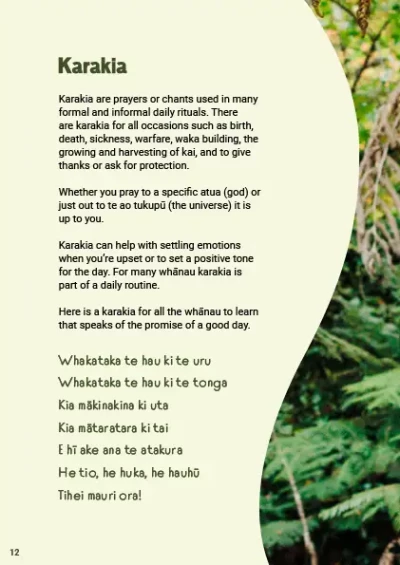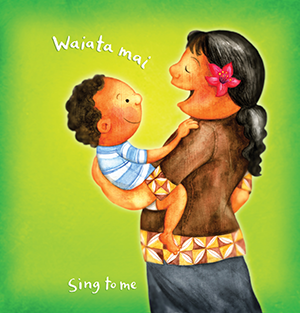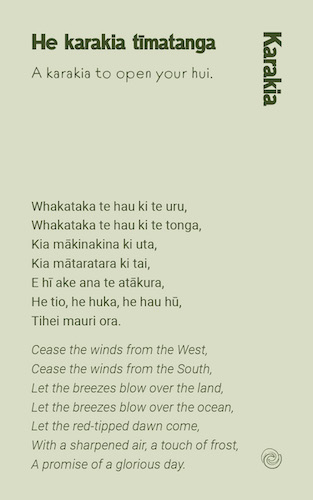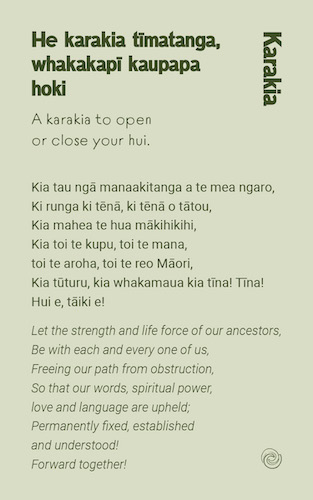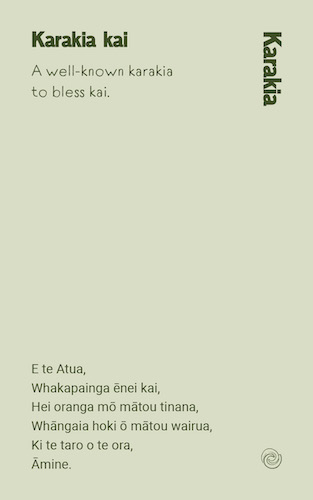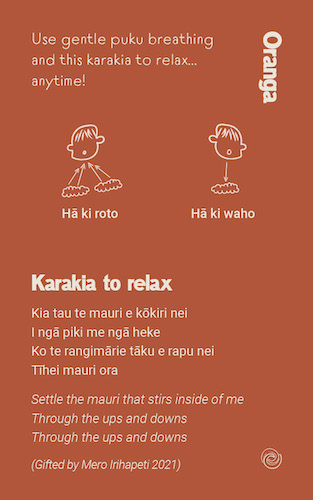
Karakia
Karakia are prayers, chants or incantations. They can be said for many purposes and to different spiritual beings, although in modern times, they may have a Christian form.
Karakia are prayers or chants used in many formal and informal daily rituals.
There are karakia for all occasions, such as birth, death, sickness, warfare, waka building or the growing and harvesting of kai, and daily karakia that give thanks or ask for protection. Whether you pray to a specific god or just out to somewhere in the world, is up to you.
Karakia can help with settling emotions when you’re upset or to set a positive tone for the day.
Learning simple karakia and using them regularly can be a way to strengthen connections as a whānau and use te reo more often.
Karakia may be part of daily ritual to bless whatever the new day brings or to give thanks for blessings received at the close of each day.
Traditional use of karakia
In ancient times, all people used some form of karakia in their daily lives and on special occasions. No matter your ranking in a traditional Māori society, whether you were mokopuna or kaumātua, layman or tohunga, you would have known a number of karakia to use in different situations.
Some karakia were used for particular purposes, perhaps in rituals involved in cleansing, protecting or ordaining. In pre-Christian times, karakia were more often sung or chanted using poetic language. They were recited to the spirit world and the many atua Māori.
A Māori worldview sees no separation between the physical and spiritual dimensions of a person. Ngā iwi Māori are just another part of the natural world governed by the atua. The power of karakia comes from the atua, and through karakia, the sacredness of the person and their links to atua are confirmed.
There are karakia for all occasions – birth, death, sickness, warfare, waka building or the growing and harvesting of kai. Through karakia, a bond is made between the person reciting the karakia and the spiritual dimension they are identifying with.
In more modern times, many karakia have taken on a Christian style and are offered to the Christian God. Christian theology speaks of a time known as the resurrection, where at a time after death, the body and soul will reunite. Many karakia, especially those shared during tangihanga , refer to an afterlife when the wairua will return to the atua from which it came.
Karakia are often followed by the singing of waiata or hīmene.
Karakia in whānau
Karakia will mean different things to different whānau. For some whānau, their experience of karakia or going to church will be a normal occurrence. For others, saying karakia or attending church may be less familiar.
Karakia can be very personal and be in line with an individual’s beliefs, faith, spiritual or religious following. Karakia might also be shared as part of a group who come together under common practices and beliefs.
To help you to understand the beliefs and values of whānau read the Whakatipu Te Pihinga 2, Kaitiaki pēpi, Karakia page together with them.
Conversation ideas
Two karakia
If whānau are not familiar with karakia but are interested to know more, they might like to start with one of these.
Karakia kai (Blessing for food)
Nau mai e ngā hua o te wao,
O te ngahere, o te wai tai, o te wai Māori.
Nā Tāne, nā Rongo, nā Tangaroa, nā Maru.
Ko Ranginui e tū, iho nei,
Ko Papatūānuku e takoto ake nei,
Tūturu, whakamaua kia tina, tina
Haumi ē, hui ē, Tāiki ē
Welcome the gifts of food
from the sacred forests, from the cultivated gardens
from the sea, from the fresh waters
The food of Tāne, of Rongo, of Tangaroa, of Maru
I acknowledge Ranginui who is above me, Papatūānuku who lies beneath me
Let this be my commitment to all!
Draw together! Affirm!
Karakia tīmatatanga (Opening)
Whakataka te hau ki te uru
Whakataka te hau ki te tonga
Kia mākinakina ki uta
Kia mātaratara ki tai
E hī ake ana te atakura
He tio, he huka, he hau hū
Tihei mauri ora!
Cease the winds from the west
Cease the winds from the south
Let the breeze blow over the land
Let the breeze blow over the ocean
Let the red-tipped dawn come with a sharpened air.
A touch of frost, a promise of a glorious day.
